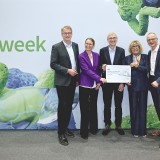
Colorectal cancer prevention and screening have been much-discussed topics in Austria for some time. Unlike other European countries, Austria still lacks a nationwide colorectal cancer screening programme as a preventive measure. This is not due to a lack of professional awareness but rather because of conflicting interests within the Austrian healthcare system. Germany, for example, has offered nationwide colorectal cancer screening as a health insurance service for over 20 years, demonstrating that a different approach is possible. During UEG Week, Europe’s largest gastroenterology congress, which takes place from October 12-15 in Vienna, Austrian specialists met with representatives from healthcare, health policy, and patient organisations to exchange best practices and experiences. The aim is to push forward the implementation of a nationwide colorectal cancer screening programme in Austria in the near future.
2000-2019: 19% increase in colorectal cancer deaths in Europe
Long-term statistics from the UEG White Book 2 show a drastic increase in digestive diseases and cancers in recent years, with serious consequences:
- The most common digestive cancers have seen a 26% increase in incident cases from 2000-2019.
- These cancers account for over one-third of all cancer-related deaths in UEG member countries.
- Colorectal cancer, in particular, represents the highest proportion, with a 33% rise in incidence and a 19% increase in mortality from 2000 to 2019.
Alarming figures in Austria
The statistics in Austria are equally concerning. In 2019, more than 20,000 women and over 23,000 men were living with colorectal cancer , of which around 5,000 were new cases, and over 2,500 people died from the disease. The main causes of colorectal cancer are lifestyle-related risk factors, such as a low-fibre, high-fat, high-salt diet, high alcohol and tobacco consumption, obesity, and lack of physical activity. The most effective preventive measure remains colonscopy screening, which can often prevent colorectal cancer or at least detect it early. Early detection greatly improves the chances of survival, reduces suffering for patients, and saves costs for the healthcare system.
All players in the Austrian healthcare system must act
The National Screening Committee, the Austrian Society for Gastroenterology and Hepatology (ÖGGH), the Austrian Cancer Aid Society, and numerous other stakeholders are unanimously calling for the introduction of a national, quality-assured colorectal cancer screening programme for the population aged 45 and above. However, the final implementation of such a programme has been delayed, not due to a lack of scientific evidence or awareness, but rather because of differing interests within the Austrian healthcare system and the varying approaches of many federal states – an issue linked to federalism. Given the steep increase in mortality between 2000 and 2019, the need for Austria to introduce a national colorectal cancer screening programme is now more urgent than ever.
UEG Week: European Gastroenterology Congress in Vienna
From October 12-15, 2024, more than 12,000 experts from over 120 countries gathered in Vienna for UEG Week to present and discuss the latest research and scientific developments in gastroenterology. Austrian experts, particularly representatives from the ÖGGH, used the congress to raise awareness and as a call to action for Austrian health policy. Best-practice examples and innovative solutions from other countries have been shared, with the primary aim of implementing a comprehensive colorectal cancer prevention and screening programme in Austria to reduce the high incidence and mortality rates.
Quotes:
Mag. Dr. Christina Dietscher, Head of the Department of Non-Communicable Diseases and Psychosocial Health, BMSGPK: “Our population is ageing, which increases the likelihood of developing cancer over the course of one’s life. Early detection and cancer prevention can make a significant contribution to life expectancy and quality of life for those affected. One of the health department’s key tasks is to work with experts to define the framework for prevention and early detection, with the aim of improving the coordination of existing activities and initiatives, and ensuring quality-assured care for the Austrian population. Based on recommendations from the National Screening Committee on Cancer, the BMSGPK is therefore working on preparing an organised colorectal cancer screening programme in Austria.”
Ing. Evelyn Groß, President of the Austrian Crohn’s Disease / Ulcerative Colitis Association: “Our ongoing exchange with people affected by chronic inflammatory bowel diseases and their families highlights the urgent need for a comprehensive colorectal cancer prevention and screening programme across Austria. Not only would those of us in high-risk groups benefit, but so would the general population aged 45 and over, as well as the healthcare system.”
Prim. Univ. Prof. Dr. Harald Hofer, President of the Austrian Society for Gastroenterology & Hepatology (ÖGGH): “The scientific evidence is clear. If polyps, which are potential precursors to colorectal cancer, are detected and removed during a colonoscopy, colorectal cancer can be prevented. This is a major advantage compared to other cancers. As a medical society, we urgently call for the nationwide implementation of a screening programme for everyone aged 45 to 75, as this could save many lives.”
Doris Kiefhaber, Executive Director of the Austrian Cancer Aid Society: “While it’s promising that all key stakeholders recognise the need for an organised colorectal cancer screening programme, it is unfortunate that a standardised approach is still lacking nationwide. This inconsistency makes it harder to raise public awareness and promote participation. Our long-standing experience has taught us that only clear, coherent communication will ensure the public fully understands the critical role of early cancer detection.”
Dr. Andreas Krauter, MBA, Head of Medical Services at the Austrian Health Insurance Fund: “Screening colonoscopy is one of the preventive measures that allows for both diagnosis and treatment of many bowel diseases in a single procedure. If a malignant tumour is detected early, therapeutic steps can be taken in time to enable a cure. Therefore, every Austrian is encouraged to take advantage of this opportunity. The ÖGK acknowledges the widely recognised findings across Europe and emphasises that taking advantage of this opportunity can prevent immense personal suffering for the individuals affected and their families, while also ensuring that the ever-rising costs of healthcare are better managed.”
Prof. Dr. Thomas Theodor Seufferlein (Member of the UEG Public Affairs Group, University Hospital Ulm): “The gathering of knowledge and experience at a congress like UEG Week is invaluable. Numerous international experts share their insights on colorectal cancer prevention and screening programmes, providing valuable input for their implementation in various countries. We must not only focus on quality assurance in the screening process, but also address lifestyle-related risk factors such as unhealthy diets, obesity, and physical inactivity. Both high-quality screening programmes and a healthy lifestyle are crucial to significantly reducing the incidence and mortality of colorectal cancer in the long term.”
-
Contact




Please log in with your myUEG account to post comments.